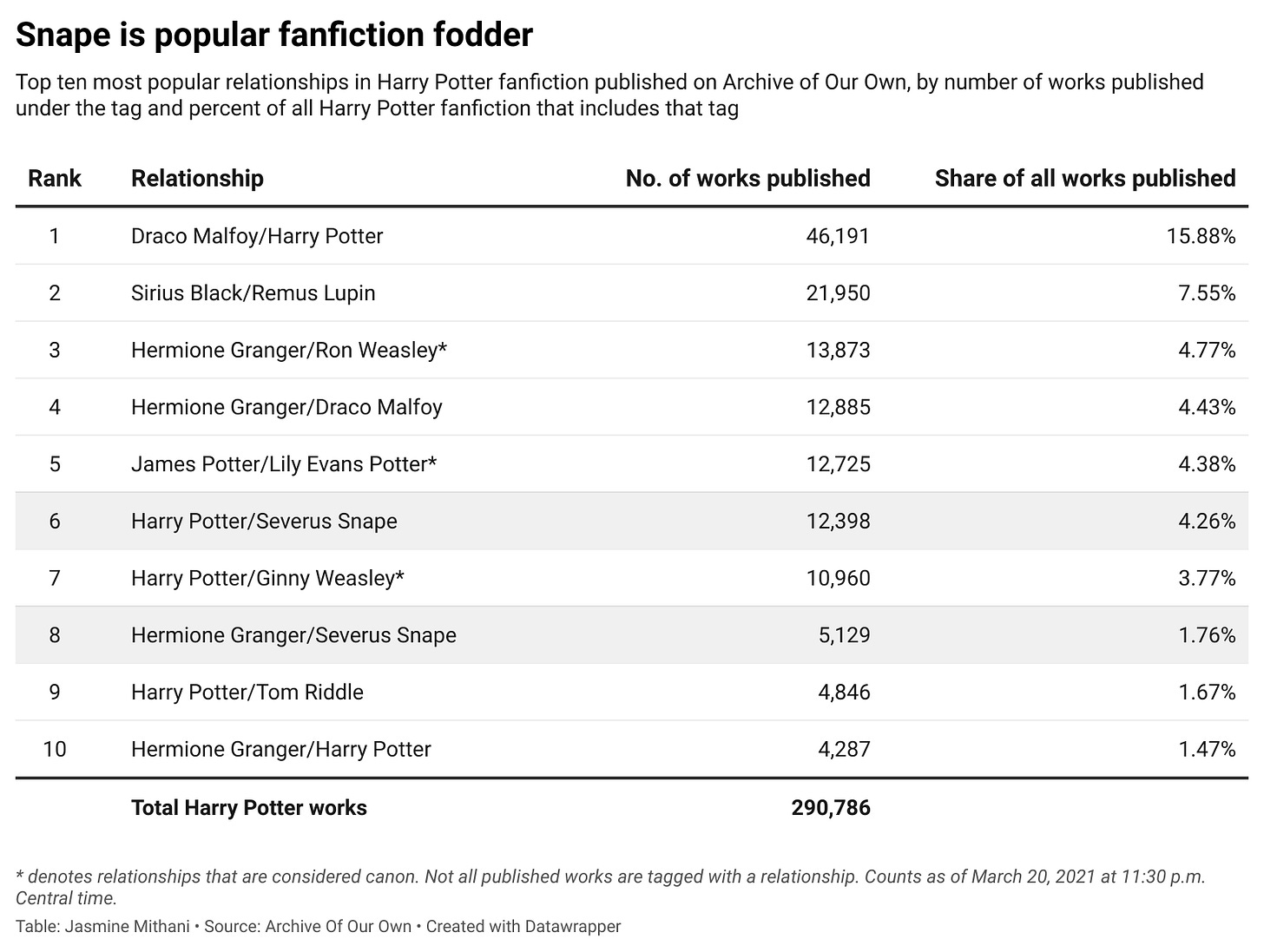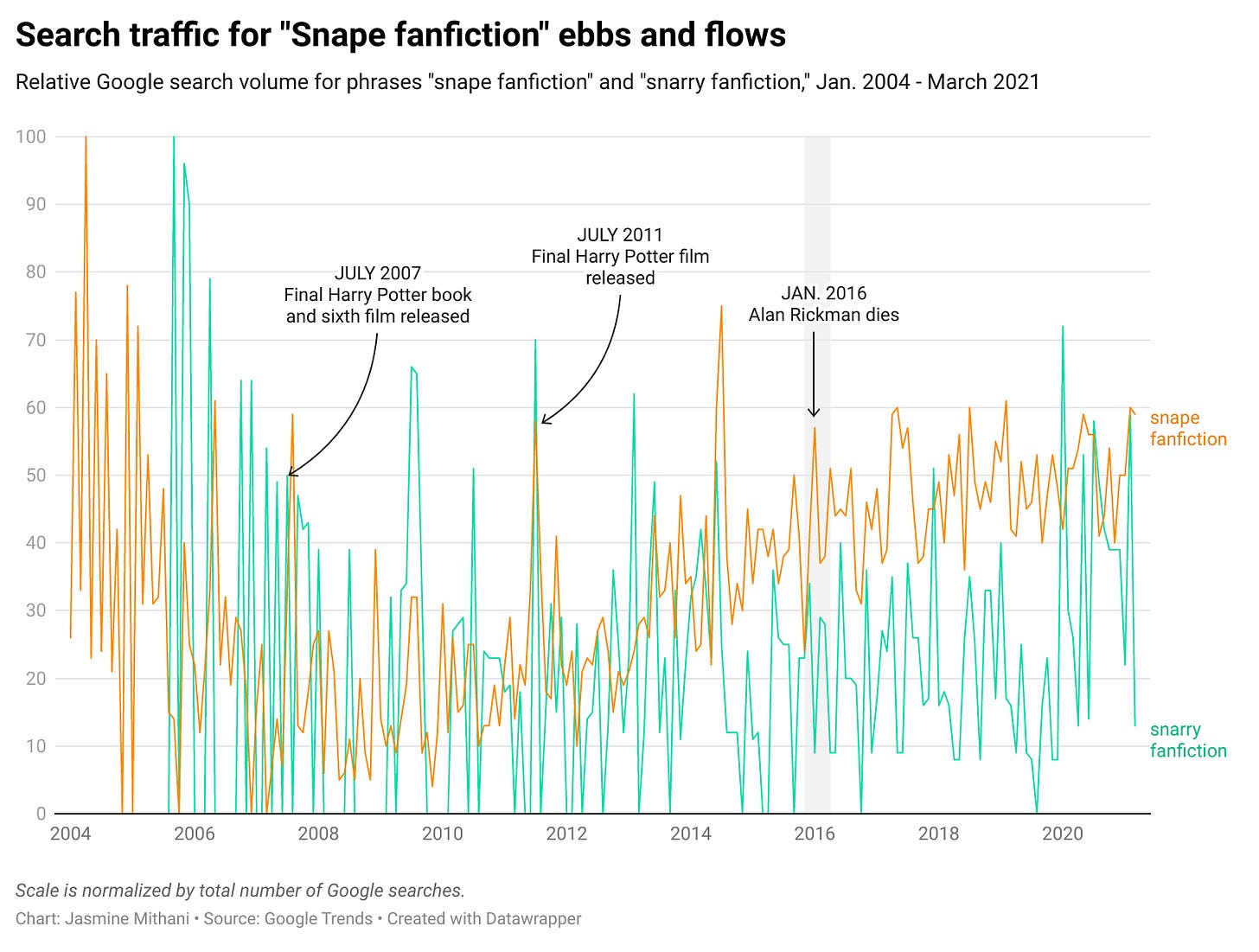Do fanfiction reading habits change after a celebrity death?
Investigating a question that has been haunting me for months. With apologies to Alan Rickman and my parents.
Dozens of questions fly through my head each day. A portion exit as quickly as they made their presence known; some I can answer with a quick Google; others, however, require sleuthing. The latter ones are the questions I keep filed away for a rainy day, that I scribble on the nearest note card so I don’t forget to research it later.
Today we will journey through one of these rabbit holes together.
I recently saw news about a dead celebrity and immediately thought – does fanfiction consumption change when the actor of a beloved character dies? Morbid thought, couldn’t shake it. Had to know.
How do we find this out? The quickest way to get a sense of an answer would be to look at search traffic to see if there was a spike in relevant search terms around an actor’s death. Google Trends makes this extremely easy, and though the tool has its faults as long as we remain cognizant of them we can use it for some quick hypothesis-checking.
Google Trends charts the relative popularity of a search term over time, so an interest value of 100 is the most popular a term has ever been while an interest value of 50 indicates the term is only half as popular as it has ever been. An interest value of 0 means there wasn’t enough data to compare. All of the data is normalized by the total number of Google searches in order to provide a consistent comparison. We can think of the Y axis as “share of maximum search volume.”
Another gotcha with Google Trends is that all data is based on a random sample. Therefore, it’s possible to run the same query and get very different results. Since this is a fun exercise and not undergoing rigorous peer review, I’ll account for this with the high-tech technique of refreshing the page a bunch of times over several minutes to see if numbers change significantly. If they do, I’ll note it.
The next step is honing in on a few case studies and then determining a set of keywords to gather data on. Google Trends only goes back to 2004, so we need to come up with contemporary characters.
A few people come to mind: Alan Rickman (Severus Snape) and Carrie Fisher (Princess Leia). I know nothing about Star Wars so let’s look into Alan Rickman.
I am unfortunately plugged enough into the Harry Potter fanfiction community to know Snarry – yes, the Snape and Harry Potter coupling – is one of the most popular pairings to write about.
Using this information solely as a basis for keywords and not contemplating the upsetting power dynamics of that hypothetical relationship, we can settle on the set of [“snape harry”, “snarry”, “snape”] x [“fanfiction”]. (Google didn’t have any data for phrases including “fan fiction” or “fan fic,” and appending “fanfic” yielded a similar trend to “fanfiction” so I am excluding it as a search term.) As a baseline I’ll also look at “snarry” and “snape” searches over time.
Let’s search for all of those terms to see if there is any interesting data during January 2016, the month of Rickman’s death.
These trends are not being compared; I’ve overlaid the two independent series, not charted their search volume relative to each other. If I did that, popular terms like “snape” would dwarf all the other data, and we’re not interested in information – I’m well aware that there aren’t that many people using Google to get their Harry Potter fanfiction fix.
We can see there is a slight bump in relative search traffic for “snape fanfiction” – paired with a sharp decrease in searches for “snarry fanfiction” in January 2016.
The weekly charts show a much more volatile change in search traffic and varied over different samples, so I excluded them in this write up. That weekly stochasticity also makes me suspicious of the number of relevant searches available to query, which would result in a sample too small to reasonably draw any conclusions from.
You might be tempted to roll your eyes. Obviously Jasmine! You say. Have some respect for the dead! No one wants to get horny over a dead guy!
Very true. It’s also possible that I didn’t search the right database. Anyone who even dabbles in fanfic knows to get their content from tailored sites like Archive of Our Own (AO3) or fanfiction.net – both publishing platforms with robust tagging systems so you can find your perfect Steve Rogers/James “Bucky” Barnes College AU meet cute full of domestic fluff. In the face of that powerful filtering system, using Google doesn’t make much sense.
If we were able to access the corpus of, say, AO3, it would be interesting to investigate changes in publishing output for fiction tagged Snape or whether stories with those tags were more frequently read or saved in January 2016.
Unfortunately, neither AO3 nor fanfiction.net offer their own APIs. There is one promising independent library created by some fan studies researchers, and maybe one day I’ll explore questions of Snape-related fanfic production. Likewise, it would be useful to replicate the Google Trends investigation with other celebrities, like Carrie Fisher, to see if there is a pattern. My intention was to do this multiple times, but what can I say, I lost steam.
Right now my curiosity is satisfied.
Finally, one obvious limitation of using Google Trends data is that we aren’t able to determine why those trends happen. It’s easy to identify key chronological events that might have had an effect on search volume, but there isn’t a way to suss out why search behavior changed. We don’t know if people were searching for their favorite fic, fondly remembering a beloved character, or if aging Harry Potter fans suddenly remembered how horny they were for Hogwarts’s emo professor of potions. It could be fun to speculate, but it’s not good science. And yes, dear reader, this is science.
If you have comments, complaints about my experimental design, or quibbles with my methodology drop a comment or hit reply.
Keep in touch,
Jasmine




